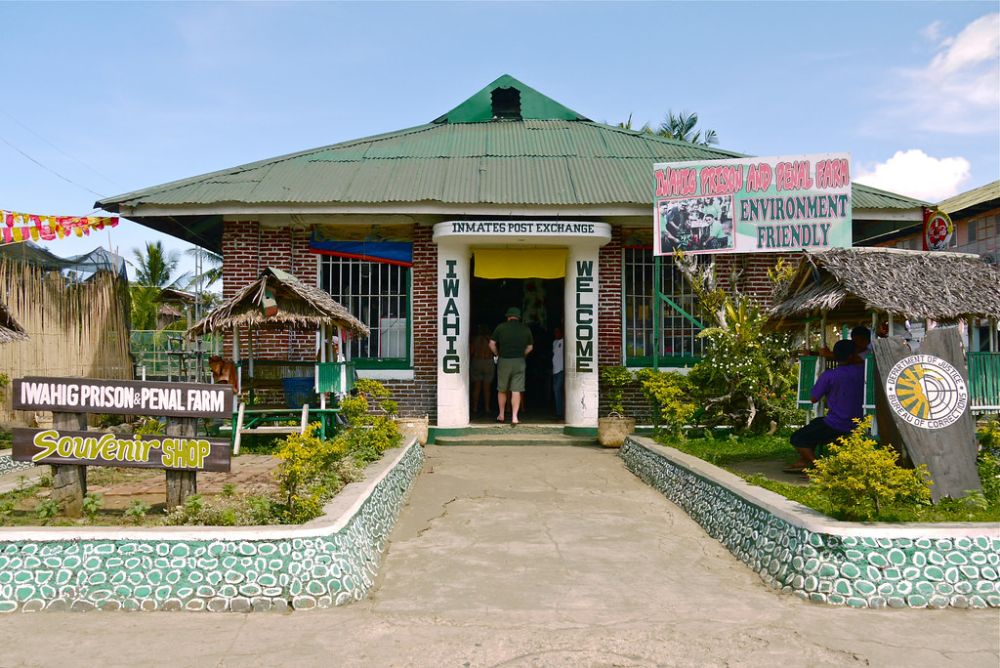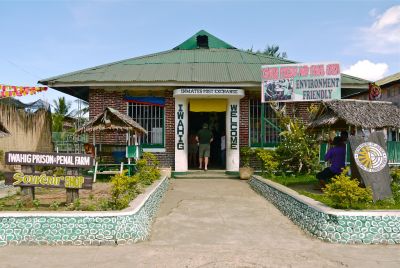

Experience a unique tour of the historic Iwahig Prison and Penal Farm. Unlike conventional penitentiaries, Iwahig operates more like a community than a cellblock. Inmates, who are deemed low-risk, live in dormitory-style quarters and are allowed to farm, fish, and engage in handicraft-making to earn an income. Tourists can learn about the penal system's history and interact with inmates who share their stories. You might even witness cultural presentations featuring dance or music performed by the inmates. Purchasing handicraft souvenirs made by them is an opportunity to support their reformation journey.
Within the Iwahig Prison and Penal Farm, visitors have the chance to purchase unique handicrafts made by the inmates as part of their rehabilitation program. These items include intricately crafted wood carvings, bags, and other woven goods. Tourists can browse these hand-made products at the on-site souvenir shop. The products are not only tokens of your visit but also contribute to supporting the inmates' livelihood, providing them with skills and income to prepare for their eventual reintegration into society.
Particularly enthralling is the firefly watching boat tour offered at the Iwahig River, which flows near the penal farm. As dusk falls, guides take visitors on a serene boat ride where they can witness thousands of fireflies illuminating the mangrove trees along the riverbank—a truly magical spectacle. It's a peaceful and educational experience, with guides explaining the fireflies' behavior and the importance of preserving their natural habitat for ecological balance.
A cultural dance show often arranged by the inmates is a vibrant representation of Filipino traditions and serves as a form of entertainment and expression for the prisoners. During scheduled visits, tourists can watch these performances, which often feature folk dances and music reflective of the diverse Philippine culture. It is also an opportunity for the inmates to showcase their talents and engage with visitors in a positive, rehabilitative environment.
Guests at Iwahig can participate in a guided tour of the aquaculture projects within the farm. This activity allows visitors to learn about fish farming, which is part of the self-sufficiency and rehabilitation program for inmates. They can observe different stages of fish rearing and possibly have a hands-on experience. The tour is both an educational insight into sustainable food production practices and a practical approach for the inmates to gain agricultural skills.
The Iwahig Penal Farm's vast land is dedicated in part to agricultural activities, and visitors can take a guided tour of the fields and plantations. This immersive experience allows tourists to understand the day-to-day farming operations and the role of agriculture in the inmates' rehabilitation process. Depending on the season and work schedule, visitors may also participate in hands-on activities like planting or harvesting alongside the inmates.
Sports are an integral part of the rehabilitation program at Iwahig, and visitors can watch inmates engage in various athletic activities, including basketball games. These events promote teamwork, discipline, and wellness among the inmate population. Tourists can catch a game at the prison’s outdoor basketball court, cheer for the players, and indulge in the communal spirit that such a simple pastime can foster.
Iwahig Prison and Penal Farm is not only a correctional facility but also a sanctuary with lush landscapes and open fields. Take a nature walk and bask in the serene environment where you can observe various tropical plants and animals indigenous to Palawan. It is an opportunity to appreciate the natural beauty and tranquility of the place, providing a stark contrast to the bustling city life. The walk can be quite soothing and offers a chance for reflective thought on the purpose of such a unique penal institution.
Visitors can take a tour of the carpentry workshop where the inmates create furniture and other wooden crafts as a part of their skills development. This inside look not only demonstrates the workmanship and artistry of the inmates but also provides insight into the therapeutic and economic benefits of vocational training within the correctional system. Tourists might have the chance to commission or purchase pieces directly, supporting the program.
Leveraging the knowledge and skills of the inmates involved in the farm's operations, the penal farm sometimes organizes educational sessions for visitors. These sessions may cover sustainable agriculture, livestock rearing, and other topics relevant to the farm's efforts in providing a self-sustaining model for rehabilitation. Engaging with the inmates through these sessions can offer unique perspectives on the agricultural lifestyle as a means for personal and communal growth.
